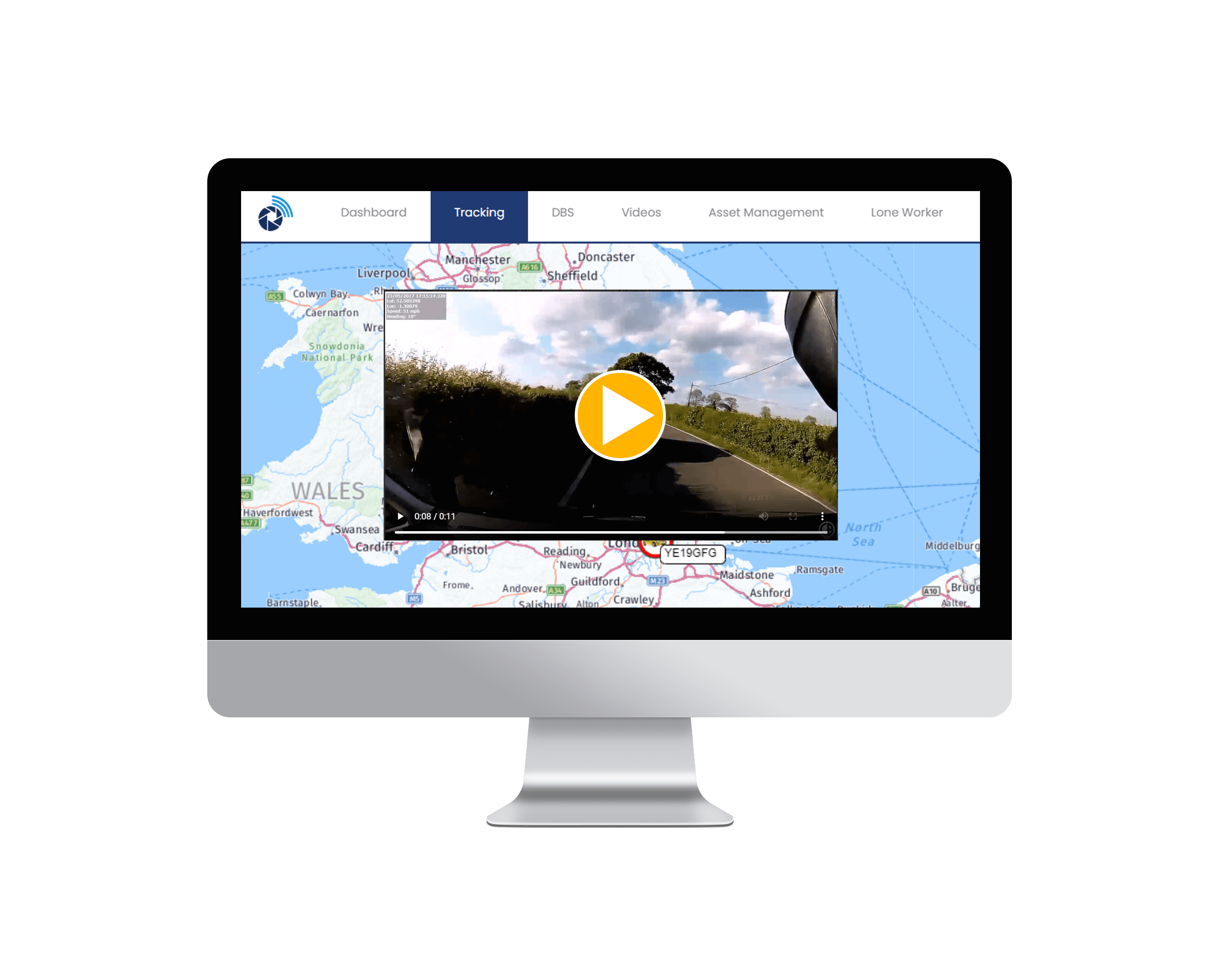More than one million dash cams have been installed in commercial and private vehicles in the UK. Depending on the set-up you choose, your dashboard cameras can record what’s happening in front and around the vehicle and what’s happening inside. With data and privacy becoming hot topics as dash cam and social media use continue to escalate, many people are curious about dash cam laws in the UK.
Navigate this legal landscape with Crystal Ball’s guide to legally using 4G fleet dash cams. We cover data protection considerations and the implications for private and commercial vehicles, privacy issues, and the admissibility of dash cam footage in legal proceedings.
Current Regulations: Using Dash Cams Legally
Dash cams are legal to install and use in the UK. You do not require any special permission to use them on our roads. However, whether you are thinking about installing or have already installed dash cam/s in your private vehicle or a fleet of commercial vehicles, you should be aware of the dash cam positioning UK law. You also should be aware of dash cam laws regarding operating them while driving and using them when you have passengers.
Legal Placement of Dash Cams in the UK
According to the law, dash cams must be installed safely and must not obstruct the driver’s view of the road ahead in any way. The Highway Code specifies that nothing may intrude more than 40mm into the area of the windscreen swept by the wiper blades.
You could receive fines of up to £1,000 and three penalty points under Rule 30 of the Highway Code if your dash cams are installed in a way that contravenes the dash cam positioning UK law. Additionally, any footage recorded on illegally positioned dash cams could become inadmissible in legal proceedings.
While the police can check your dash cam’s position, the legal placement of dash cams in the UK is also part of the annual vehicle safety test (MOT test). The individual conducting your vehicle’s MOT test will check whether items such as dash cams placed in or stuck to the windscreen or cracks, discolouration, or surface damage to the windshield itself seriously obstruct the driver’s vision.
If your dash cam intrudes more than 40mm into the area swept by the wiper blades, your vehicle could fail the test. The best place to install a dash cam is at the top of the windscreen.
Operating a Dash Cam
Dash cam laws in the UK also make it illegal to switch your dash cam on or off or change its settings while driving. Operating a dashboard camera while driving is comparable to using a handheld mobile device, contravening the Highway Code’s Rule 149.
If you are caught operating a dash cam while driving, you could receive a £1,000 fine and up to six penalty points. Ensure you or your fleet drivers set up and activate the dash cam before you or they start driving.
Dash Cams and Passengers
Whether your vehicle is private or commercial, the UK’s dash cam laws stipulate that you must inform any passengers that they are being recorded. This is due to potential privacy breaches caused by dash cams recording footage and, in some cases, sound inside the vehicle.
The dash cam warning sticker law in the UK applies if you manage a fleet. Place a dash cam sticker letting passengers know that the camera is recording for safety purposes inside your vehicles to comply with this law.
Dash Cams in Other Countries
While dashboard cameras are legal to install and use in the UK, the situation differs in several other countries. For example, Austria and Portugal’s dash cam laws forbid the use of these cameras. German legislation changed recently to allow dash cams. In other countries, you can use dash cams on some roads but not on others.
Some countries allow the use of dash cams while restricting who can view the footage and where and how you can share it. Check whether there are local dash cam restrictions or regulations before travelling abroad with your vehicle, whether it is commercial or private.
Dash Cams and Data Protection Considerations
You need to consider the UK’s privacy and data protection laws if you use dash cams in your vehicles. Your cameras’ collection of video and sometimes audio data means you have various responsibilities under the Data Protection Act 2018 and the General Data Protection Regulation (GDPR).
One of the most important of these responsibilities is the obligation to protect the identities of other individuals in your dash cam footage. Unless you have consent or a legitimate reason to share the footage and information therein, you’re usually required to blur out faces and vehicle number plates.
According to the Information Commissioner’s Office (ICO), you can use dash cams in your fleet’s vehicles, provided that you can justify their use. As per recording laws in the UK, you must tell people they are being recorded, and you must handle the footage responsibly. It’s vitally important that you are aware of legal issues around using driver-facing dash cams and people’s rights to privacy and data protection.
The ICO recommends that you familiarise yourself with the following points before installing dash cams:
Be sure a dash cam is your best option: Ensure you have a lawful basis for installing dash cams in your vehicle or vehicles, as there are limits on what you can do with other people’s data. If possible, choose dash cams that do not record audio.
Tell people they are being recorded and explain why: As mentioned above, comply with privacy and data protection laws by telling people they are being recorded and explaining why you’re recording them. You also need a privacy notice explaining your lawful basis and how you will use their information. While this notice does not need to be present in the vehicle, your dash cam sticker should let people know where to find it, such as on your company website.
Protect your dash cam footage: According to privacy, data protection, and recording laws in the UK, you have a responsibility to protect any data you collect, use, or share that can be used to identify someone. Consider limiting access to stored dash cam footage and using password protection, and do not share your recordings on social media.
Delete footage you no longer need: If you have used the footage and other data you collected and have no other reason to keep it, delete it after a week or so. There’s no hard and fast rule about how long you should keep dash cam footage. To help you decide how long to keep it, consider your reasons for installing dash cams and consider any applicable industry standards.
Ensure your data protection fee payments are up to date: You will need to register and pay a data protection fee to the ICO if any of your fleet’s vehicles have a dash cam. For most small businesses, the fee is £35 a year. Fee payments are your company’s responsibility, rather than the responsibility of your employees.
Dash Cams: Common Legal Concerns
Two of the most common legal concerns around dash cam laws involve privacy issues and the admissibility of dash cam footage in legal proceedings.
Privacy Issues
Whether your dash cams capture footage of your drivers, passengers, or other road users, they have rights. According to the ICO, one of those is the right to request copies of their data from you. Familiarise yourself with dash cam privacy laws, learn to recognise and deal with data requests, and ensure that you implement a strong data protection policy.
Dash Cam Footage in Legal Proceedings
Neither the UK’s dash cam laws nor any other laws prevent dash cam footage from being submitted in legal proceedings, as it can be valuable in a legal context. However, the courts will only consider your footage if it fulfils various criteria.
For dash cam footage to be admissible in court, it must:
- – Show details such as number plates
- – Be authentic, time-stamped, and unedited
- – Be relevant to the case
- – Be submitted through legal representation or in another accepted way
In the UK, there is a high standard for the admissibility of dash cam footage. Seek legal advice before using your footage as evidence.
Dash Cams: Powerful When Used Responsibly
Dash cams can be powerful tools in private vehicles and commercial fleets. They can provide valuable evidence, help fleet managers monitor driver behaviour to identify commendable drivers, and coach drivers whose driving skills and behaviour need improvement. These cameras can also help reduce insurance premiums and act as a deterrent to theft. However, they need to be used responsibly.
Make the most of your dashboard cameras from Crystal Ball while ensuring you comply with UK dash cam laws.


